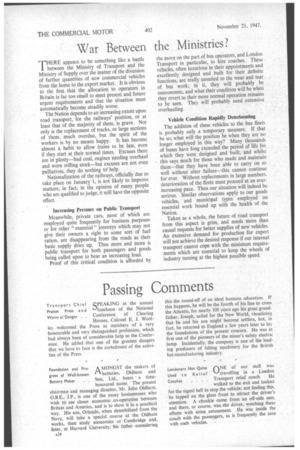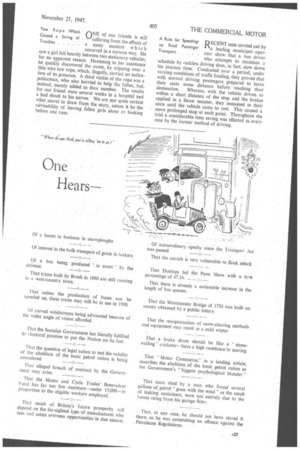Passing Comments
Page 26

Page 27

If you've noticed an error in this article please click here to report it so we can fix it.
Transport Chief SPEAKING at the annual Praises Press an d t-'luncheon of the National Warns (g Danger . . Conference of Clearing
Houses, Colonel E. J. Woolley welcomed the Press as members of a very honourable and very distinguished profession, which had always been of considerable help to the Conference. He added that one of the greatest dangers that we have to face is the curtailment of the activities of the Press
Foundation and ProA MONGST the makers of gress of Well-known 1-1 batteries, Oldham and Battery Maker . Son, Ltd., bears a timehonoured name. The present chairman and managing director, Mr. John Oldham, 0.B.E., J.P., is one of the many businessmen who wish to see closer economic co-operation between Britain and America, and is to show it in a practical way. His son, Orlando, when demobilized from the Navy, will take a specialcourse at the Oldham works, then study economics at' Cambridge and, later, at Harvard University, his father. considering A24
this the round-off of an ideal business education. If this happens, he will be the fourth of his line to cross the Atlantic, for nearly 100 years ago his great grandfather, Joseph, sailed for the New World, visualizing that he and his son might become settlers, but, in fact, he returned to England a few years later to lay the foundations of the present concern. He was at first one of the pioneers of the miner's safety electric lamp. Incidentally, the company is one of the leading producers of felting machinery for the British hat-manufacturing industry.
Londoners Not Quite Used to Relief Coaches . .
nNE of our staff was • -" travelling in a London Transport relief coach He walked to the exit and looked for the signal bell to stop the vehicle; not finding this, he tapped on the glass front to attract the driver's attention. A chuckle came from an off-side seat, and there, or course, was the driver, watching these efforts with some amusement. He was inside the coach with the passengers, as is frequently the case with such vehicles.
Coaches . .
Tow Rope Which ()NE of our friends is still Caused a String of "-'suffering from the effects of Troubles , . . . . a nasty incident which occurred in a curious way. He saw a girl fall heavily between two stationary vehicles, for no apparent reason. Hastening to her assistance he quickly discovered the cause, by tripping over a thin wire tow rope, which, illegally, Carried no indication of its presence. A third victim of the rope was a policeman, who also hurried to help the fallen, but, instead, merely added to their number. The results for our friend were several weeks in a hospital and a bad shock to his nerves. We are not quite certain what moral to draw from the story, unless it be the advisability of leaving fallen girls alone or looking before one runs. A Rule for SpeedingRECENT tests carried out by up Road Passenger "a leading municipal • oper Transport ator show that a bus driver who attempts to maintain a schedule by reckless driving does, in fact, slow down his journey time. Conducted over a period, under varying conditions of traffic loading, they proved that with normal driving passengers prepared to leave their seats some distance before reaching their destination. Whereas, with the vehicle driven to within a short distance of the stop and the brakes applied in a fierce manner, they remained in their seats until the vehicle came to rest. This caused a more prolonged stop at each point. Throughout the trial a considerable time saving was effected in every case by the former method of driving.




















































































